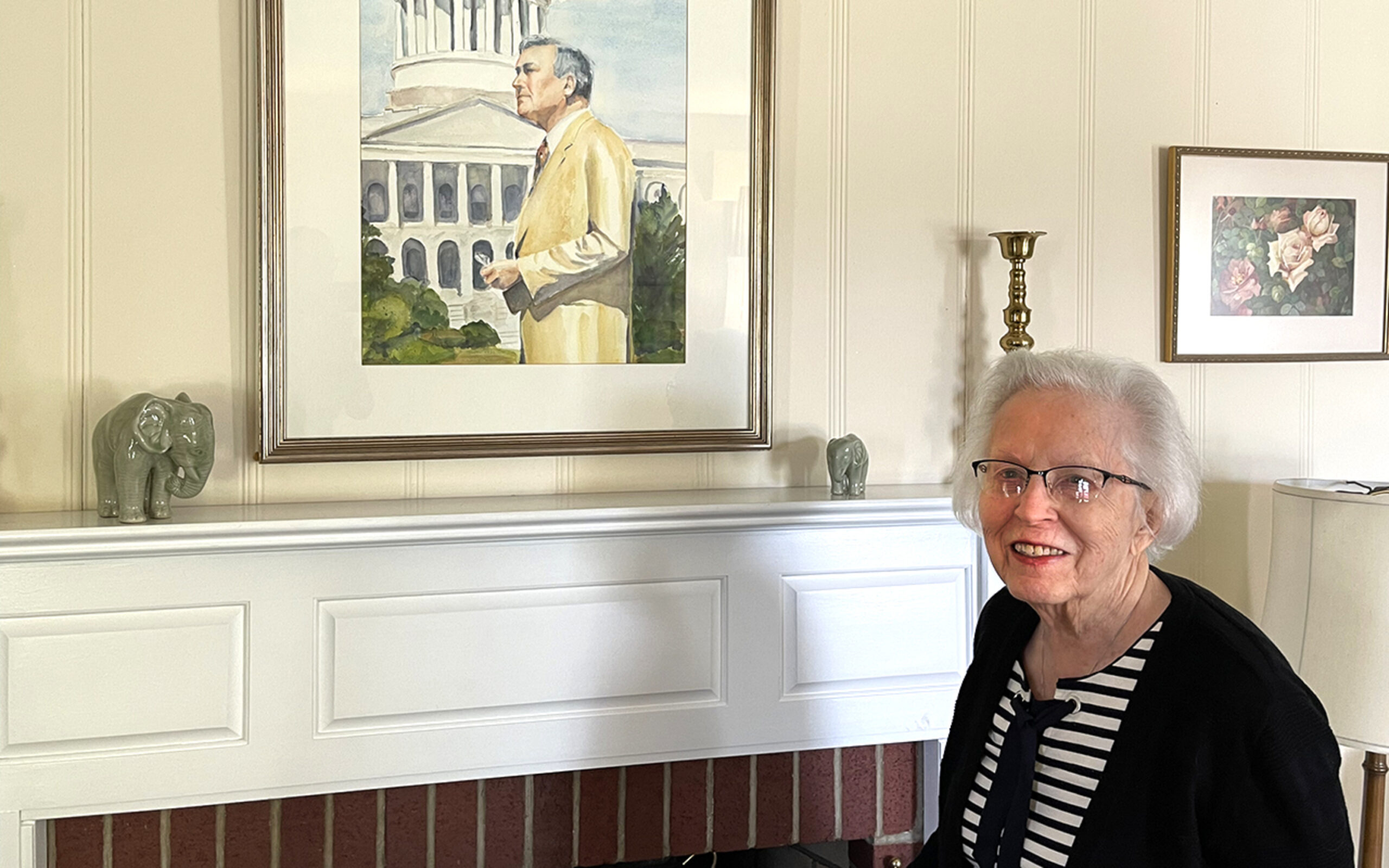
CARIBOU, Maine — One of Maine’s leading citizens traces her residence in Caribou to the abundance of ragweed in New York in the 1930s.
Born in Barranca Bermeja, Colombia, where her father was an electrical engineer, Patricia McGuigan Collins grew up in Port Jervis, New York, after the age of 3. Every spring, when the ragweed bloomed, her mother took her to Beach Haven on the New Jersey coast to give young Patricia relief from hay fever.
One year, the cleansing onshore winds reversed and blew pollen from the land to the coast, aggravating the child’s allergies. They had to get away and, as a result, discovered a new retreat: Rangeley, Maine. Pat’s mother studied a map showing where ragweed was prevalent and determined Maine was safe because it lacked the number of hours of darkness required for ragweed to bloom. They returned to Rangeley every year thereafter.
“We stayed until the first frost (in New York, not Maine),” Collins recalled recently, which meant she had to register for school late every fall. When the time came for her to choose a college, the family decided, “If she goes to the University of Maine, maybe she could start school on time.”
She enrolled in a pre-med program where she met a student from Caribou, Maine, named Doug Collins. Doug introduced her to his brother, Don, soon after he returned from serving in World War II in 1946. The two hit it off.
“Don had an advantage,” she said. “He could dance.”
They were married Feb. 28, 1948, in the living room of the Unitarian Universalist minister in Orono and settled in Caribou, where Don applied his degree in business administration at his family’s S.W. Collins Lumber Company.
“I was not universally accepted,” Collins said of her first years in Caribou. She remembered an aunt of her husband who would deliver bread to the door saying, “Poor Don; he so loves homemade bread.” She resolved she would learn to bake bread. That commitment was the beginning of a long career of excellent cooking that earned her a reputation worthy of two cookbooks: “Fifty Years of Cooking 1948-1998” and “Encore 1998-2010.”
She also became a portrait artist. Collins and her mother, Helen Foskett McGuigan, lived with her grandparents in New York after her parents divorced, and her grandfather taught her to paint. He owned the John James Foskett Decorating Company, a factory for hand-painting china. A native of Hanley, Staffordshire, England, Foskett created the patterns for the designs his employees painted on china tableware.
“When people talk about an artist, I think of a commercial artist,” Collins said. Her grandfather had other attributes she admired. “He was five feet four and he could tap dance. He smoked a pipe and adored terrible puns, like, ‘I feel great, but I’ve seen a nutmeg grater.’”

Pat Collins’ grandfather taught her to paint. He owned a factory for hand-painting china tableware and created designs, like these framed in her Caribou home, for the John James Foskett Decorating Company. (Courtesy of Lise Collins)
She also admired her grandmother, Mabel Foskett.
She was very smart – the smartest person I knew,” Collins said. She read the classics and was particularly fond of Robert Burns, who shared her Scottish ancestry. She also sewed, a talent she passed on to her daughter, Helen, who claimed she could cut out a dress in the morning and be sewing the hem by evening. Collins also inherited her grandmother’s love of reading.
“You’re no fun,” Helen would tell her daughter. “You always have your nose in a book.”
Collins picked up the paintbrush again in the 1980s after raising six children (one of whom became a U.S. senator) and while still in the midst of a long career of public service. She chaired the Caribou School Committee, the University of Maine Board of Trustees, the Maine Committee for Judicial Responsibility and Disability, the Catholic Charities of Maine Board of Directors, the Catholic Foundation of Maine Board of Trustees and the Caribou Charter Commission.
She was the mayor of Caribou and served on the Caribou Library Board and City Council, the Holy Rosary Parish Council, the Maine Medical Center Board of Corporators, the University of Maine at Presque Isle Board of Visitors, the Maine Women’s Forum and the National Advisory Council of the U.S. Conference of Catholic Bishops.
Nonetheless, she found time to advance her own higher education. She returned to the University of Maine to complete her bachelor’s degree in math, graduating in 1970 as a Phi Beta Kappa. Then she reignited her passion for painting by earning a bachelor’s degree in art at the University of Maine in Presque Isle in 1986.
“I wanted to do watercolor portraits,” she said, explaining she took a course in photography and painted from color slides. “I did three or four paintings to work out the problems,” she said of her process for perfecting a portrait. She painted family members, including all her grandchildren, friends and presidents of the University of Maine at Presque Isle.
When her work was exhibited at UMPI, her subjects stood beside their portraits, smiling and nodding at compliments on the likenesses. Amused, she said, “It was as though they had done the paintings themselves.”
Now, at age 94, Collins sees only shadows with one eye and has peripheral vision in the other.
“Everybody gets something,” she said, observing that often people lose the ability to do what they love most. “Everyone gets what they can’t stand.”
She predicted she would lose her vision because she loved to read and paint. Yet she is uncomplaining.
“You can either whine and groan or accept it and do the best with what you have,” she said. “You have to dwell on what you have left.”







